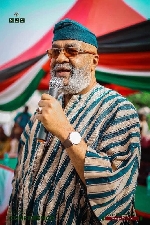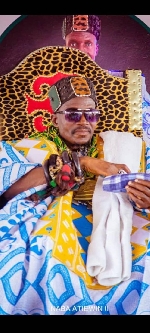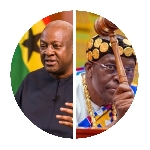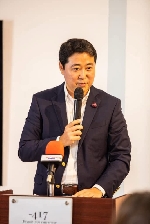Anti-gay bill: ‘I’m in charge not you’ – Bagbin warns Akufo-Addo to stay off; slams US Vice President’s gay rights comment
 Right Honourable Alban Kingsford Sumana Bagbin, the Speaker of Ghana's Parliament
Right Honourable Alban Kingsford Sumana Bagbin, the Speaker of Ghana's Parliament
Speaker Alban Bagbin has told President Nana Akufo-Addo that he should stay out of the parliamentary processes being gone through concerning the anti-gay bill that is currently before parliament.
At a breakfast meeting, Mr Bagbin said parliament will pass the bill and will not allow anyone to dictate to it.
“So, please, the committee members that we referred the bill to, we want the report. Don’t be intimidated by any person. Please let the report flow. We need to legislate”, Mr Bagbin said, adding: “Our friends just passed their law in Uganda”.
He pointed out: “We may not go the way they [Uganda] have gone because our constitution is very clear as to the direction we should move and, so, we’ll be guided by that because if you pass any law against the constitution, it’s unconstitutional. So, we have to do that. And, so, what are you afraid of? If you have a whole people behind you, [what are you afraid of?] If God is with you, who can be against you”.
During her three-day visit to Ghana which ended on Tuesday, 28 March 2023, US Vice President Kamala Harris made subtle reference to the treatment of homosexuals, saying: “I feel very strongly about the importance of supporting freedom and supporting the fighting for equality among all people, and that all people be treated equally. I will also say that this is an issue that we consider, and I consider to be a human rights issue, and that will not change.”
Mr Bagbin took issue with the US Vice President’s comment, saying: “This thing should not be tolerated. That is undemocratic. What is democracy? That somebody else will have to dictate to me as to what is good and what is bad? Unheard of. Because we have decided to devalue ourselves and go begging? Come on!”
Mr Bagbin insisted: “The bill will be passed”.
He then warned President Akufo-Addo: “This is a word to His Excellency the president: There’s no way he can intervene. That answer he gave: ‘that it is now before parliament and when it gets to the stage he has to intervene, he’ll come in’; hey, please, this is legislation, this is not execution. Wait until we pass it and then we direct you to execute it. That is when you come in. That is why we are the representatives of the people. So, in case of law, which is part of policy, we finalise and then the executive now has the authority to implement it and execute it. Let’s get this clear”.
“While this bill is before us, he is not in charge; I am in charge. I hope the US Vice President is not yet gone but she’ll read from me”.
During the joint press conference with the US Vice President at the Jubilee House on Monday, 27 March 2023 in Accra, President Nana Akufo-Addo distanced his government from the anti-gay bill that is currently before parliament, clarifying that it is a proposal from just a few MPs as a private members' bill.
The Ghanaian leader told international journalists who enquired of the bill: "My understanding with the recent discussion I had with the chairman of the committee is that substantial elements of the bill have already been modified".
“The statement that there is legislation to that effect is not accurate,” Mr Akufo-Addo corrected the New York Times reporter.
He then clarified: “The legislation is a legislation that is being proposed as a private members' bill", stressing: "This is not an official legislation of the government but it is one that is being mooted by a handful of private members".
Attorney General Godfred Yeboah Dame, in November 2022, said parts of the anti-LGBTQI+ bill (the Promotion of Proper Human Sexual Rights and Ghanaian Family Value Bill, 2021) are unconstitutional.
In an opinion piece to the Chairman of the Committee on Constitutional, Legal and Parliamentary Affairs of Parliament, the minister of justice said “parts of the bill, in its present form, violate some fundamental rights and freedoms enshrined in the Constitution, including the right to freedom of expression, thought and conscience and freedom from discrimination”.
“Other provisions of the bill, however, pass the test of constitutionality”, he noted.
One such constitutional provision of the bill is Clause 15 – Disbandment of LGBTTQQIAAP+ group, society, association, club or organisation.
It indicates that any group, society, association, club or organisation in existence before the coming into force of this Act, whose purpose, whether partly, overtly or covertly, is to promote, facilitate, support or sustain, in any way, an act prohibited under the Bill, are to be disbanded upon the coming into force of the Act.
The AG’s memo, however, said: “With reference to article 21(1)(e) of the Constitution, a person has the right to the freedom of association, which includes freedom to form or join trade unions or other associations, national and international, for the protection of their interest. However, this right is not absolute and as indicated under article 21(4)(e), the right may be restricted in the interest of defence, public safety, public order or public health.”
“Therefore, Clause 15 is not unconstitutional”, Mr Dame said.
In another instance, he said Clause 12 of the Bill makes it a criminal offence for a person to propagate LGBTTQQIAAP+ activities through the media or any technological platform or to perform any activity to show support, sympathy or change public opinion towards LGBTTQQIAAP+ activities.
It also says the owner of a media platform, through which LGBTTQQIAAP+ activity is promoted, is also liable under the Bill unless the owner can show that the owner did not consent to the commission of the offence or exercised the degree of reasonable diligence as ought to have been exercised under the circumstances to prevent the commission of the offence.
In his opinion, the AG said “although the Constitution guarantees the right to freedom of expression, this right is not absolute and can be restricted in the interest of defence, public safety or public health as provided for under article 21 (4) (c) of the Constitution”.
Backing his assertion with law, the AG referred to the Ghana Independent Broadcasters Association v. Attorney General and Another (Jl/4/2016) [2017] GHASC 45 (03 November 2017), in which Justice Benin stated as follows: ‘Therefore, in the event of a collision the free expression will yield to the restriction imposed by article 164, for instance, aimed at curtailing media freedom. Indeed, it is only an affirmation of the view expressed by this court that there is nothing like an absolute freedom. Thus, for instance, the Constitution itself, under Article 12(2), recognises and imposes restriction and limitations on the rights guaranteed under Chapter 5 to individuals’.
“Thus, clause 12, which seeks to restrict access to the media, is consistent with the Constitution and can be implemented”, he noted.
However, he said subclause (2) of clause 12, which prohibits an activity that constitutes “sympathy” for the LGBTTQQIAAP+ group or promotes “a change of public opinion” toward an act prohibited under the Bill, is untenable.
“It is not clear how the sympathy of a person can be aroused or public opinion can be changed due to such an activity. In view of this, sub-clause (2) of clause 12, is not only inappropriate but also may not be implementable”, he noted.
The private members’ bill seeks to proscribe all forms of LGBTQI+ activity and anything related to it.
Read the AG’s full memo below:
OFFICE OF THE ATTORNEY-GENERAL AND MINISTRY OF JUSTICE
THE CHAIRMAN,
P. O. Box MB 60, Ministries, Accra
Digital Address: GA-IIO-0587 Kindly quote this number and date on all correspondence My Ref:
Your Ref: No.
Date: 19th October 2022
COMMITTEE ON CONSTITUTIONAL, LEGAL AND PARLIAMENTARY AFFAIRS, PARLIAMENT OF GHANA. Dear Sir,
RE: REQUEST FOR MEMORANDA ON THE GOVERNMENT’S POSITION ON THE PROMOTION OF PROPER HUMAN SEXUAL RIGHTS AND THE GHANAIAN FAMILY VALUES BILL 2021
I refer to the letter referenced as PS/CCLPA/21/20, headed as above and written under your direction by the Clerk of your Committee.
I am requested to “provide the Government’s position on the Promotion of Proper Human Sexual Rights and Ghanaian Family Values Bill, 2021, a private member’s Bill, currently before the Committee”. As rightly disclosed in your letter, the Promotion of Proper Human Sexual Rights and Ghanaian Family Values Bill, 2021 (“Bill”), is a private member’s bill undergoing the process of legislative enactment, pursuant to the legislative powers of Parliament under articles 93 (2) and 106 of the Constitution. Consequently, “Government’s position” on same may be of limited significance.
In furtherance of the constitutional designation of the Attorney-General as the defendant in all civil proceedings against the State (which includes Parliament) and bearing responsibility for the conduct of all civil cases on behalf of the State (including Parliament), it is proper to express a view on the validity of the Bill, as any unconstitutionality or illegality exposes the State to unwarranted civil actions.
Upon a careful review of the Bill, I make the following observations.
OBJECT OF THE BILL The Memorandum to the Bill discloses that the Bill is intended to provide for proper human sexual rights and Ghanaian family values; and to proscribe activities of lesbians, gays, bisexuals, transgender and queers.
The Bill seeks to criminalise activities of persons who hold out as lesbian, gay, transgender, transsexual or queer, persons who hold divergent sociocultural notions of sex, persons with a biological anomaly regarding their gender at birth, persons involved in the promotion of or advocacy and funding for lesbian, gay, bisexual, transgender and queer related activities, as well as persons who conduct surgical procedures to reassign an individual’s gender except for medical purposes.
The Bill further imposes a duty on citizens and relevant independent constitutional bodies to promote and protect proper human sexual rights and Ghanaian family values.
The Bill also makes any union or marriage entered into by persons of the same sex and persons who have undergone gender or sex reassignment void. Further, the Bill makes it a crime to publish or disseminate any information through an electronic device, internet service or film that evokes the interest of a child or results in a child exploring a prohibited activity under the Bill and prohibits the grant of an adoption order or a grant for fosterage where a person who identifies as lesbian, gay, bisexual, transgender, queer or any of the other categories of persons identified by the Bill.
Overall, the purport of the Bill is to provide a legislative framework for addressing issues on lesbian, gay, bisexual, transgender and queer-related activities to address societal concerns.
Against this background, I proceed to conduct an analysis of the Bill to determine the constitutionality and legality of the provisions therein. The analysis is primarily based on the Constitution, 1992, existing legislation and case law.
GENERAL PRELIMINARY OBSERVATIONS The cornerstone of fundamental human rights under the Constitution is articles 12(2), 17 (1) and 21 (1) (a), (b) and (e), which respectively guarantee equality before the law, the prohibition of all forms of discrimination and the freedom of expression, thought, conscience and belief, and association respectively.
The relevant articles are as follows.
Article 12 (2): “Protection offundamental human rights and freedoms 12. (2) Every person in Ghana, whatever his race, place of origin, political opinion, colour, religion, creed or gender shall be entitled to the fundamental human rights and freedoms of the individual contained in this Chapter but subject to respect for the rights and freedoms of others and for the public interest. “Equality and freedom from discrimination
17. (1) All persons shall be equal before the law. General Fundamental Freedoms
21. All persons shall have the right to:
freedom of speech and expression, which shall include freedom of the press and other media;
freedom of thought, conscience and belief, which shall include academic freedom; freedom to practise any religion and to manifest such practise;
freedom of assembly including freedom to take part in processions and demonstrations;
freedom of association, which shall include freedom to form or join trade unions or other associations, national and international, for the protection of their interest;
information, subject to such qualifications and laws as are necessary in a democratic society; freedom of movement which means the right to move freely in Ghana, the right to leave and to enter Ghana and immunity from expulsion from Ghana.”
The enjoyment and implementation of these rights are subject to respect for the rights and freedoms of others and the public interest.
The Bill, whilst recognising these rights, seeks to place a fetter on conduct considered against the norms and values of society to be inimical to the public interest, safety and morality.
As will be demonstrated below, parts of the Bill in its present form violate some fundamental rights and freedoms enshrined in the Constitution, including the right to freedom of expression, thought and conscience and freedom from discrimination. Other provisions of the Bill, however, pass the test of constitutionality. Further, some provisions of the Bill purport to repeat already existing legislation and, in some situations, impliedly amend provisions in existing legislation, particularly the Marriages Act, 1884-1885 (Cap 127), the Criminal Offences Act, 1960 (Act 29), the Criminal and Other Offences (Procedure) Act, 1960 (Act 30) and the Children’s Act 1998 (Act 560).
The Bill is a private member’s bill subject to article 108 of the Constitution. Article 108 of the Constitution provides:
“108. Settlement of financial matters
Parliament shall not, unless the bill is introduced or the motion is introduced by, or on behalf of, the President proceed upon a bill including an amendment to a bill, that, in the opinion of the person presiding, makes provision for any of the following: the imposition of taxation or the alteration of taxation otherwise than by reduction; or the imposition of a charge on the Consolidated Fund or other public funds of Ghana or the alteration of any such charge otherwise than by reduction; or the payment, issue or withdrawal from the Consolidated Fund or other public funds of Ghana of any moneys not charged on the Consolidated Fund or any increase in the amount of that payment, issue or withdrawal; or the composition or remission of any debt due to the Government of Ghana; or proceed upon a motion, including an amendment to a motion, the effect of which, in the opinion of the person presiding, would be to make provision for any of the purpose specified in paragraph (a) of this article. “
I am of the view that the Bill may hold financial implications for the State, particularly regarding:
the collective responsibility of citizens, educational institutions, the Executive, Legislature and Judiciary to promote the values enshrined in the Bill, under clause 3 of the Bill the payment for medical assistance or therapy by an approved service provider under subclause (6) of clause 19, clause 20 and clause 23 of the Bill, the provision of prison facilities for persons convicted of an offence to serve their terrns of imprisonment, in clauses 22 and 25 of the Bill.
Thus, the passage of the Bill is subject to subparagraph (iii) of paragraph (a) of article 108 of the Constitution.
A determination of the satisfaction of the conditions in article 108 ought to be made objectively by the person presiding over proceedings in Parliarnent on the basis of analysis properly conducted by proponents of any bill in question.
It is for this reason that section 100(1) of the Public Financial Management Act 2016 (Act 921) stipulates thus: “100(1) Any legislation to be laid before Parliament or proposal submitted for the approval of Parliament shall be accompanied by a fiscal impact analysis stating the estimated effect on revenue and expenditure for the financial year in which the legislation or proposal is expected to come into effect”.
It is observed that the Bill is not accompanied by a fiscal impact analysis required by section 100(1) of Act 921.
The stipulation in section 100(1) of Act 921 is rendered more imperative by the character of the Bill as a private member’s Bill.
I proceed to conduct a clause-by-clause analysis of provisions of the Bill. ANALYSIS OF THE BILL
1. Short title of the Bill
The use of the word “propeP’ in the short title is inappropriate as it connotes subjectivity.
Further, the use of “Ghanaian” in the title of the Bill is also not necessary as a bill passed in Ghana relates to Ghana and applies to all persons in Ghana unless a contrary intention is expressly stated. Having regard to the totality of comments made herein, a reformulation of the short title of the Bill in these terms will be appropriate:
“HUMAN SEXUAL RIGHTS AND FAMILY VALUES BILL, 2021”
This would reflect the object of the Bill to set out the sexual rights and family values of the country. A bill inherently promotes the provisions contained therein. Thus the phrase “promotion of’ is not necessary.
Long title of the Bill The long title of a bill is supposed to capture the essence of the bill.
However, as it stands, the essence of some aspects of the Bill has been captured, whilst the essence of other aspects is omitted. A long title that succinctly captures the scope of the Bill would suffice.
It is thus recommended that the long title be reformulated to read:
“AN ACT to provide for human sexual rights and family values and related matters”. Clause 1- Application
Clause 1 (d) of the Bill offends article 21 of the Constitution, particularly clause (l)(a) and (b) thereof, which provide for freedom of expression and freedom of thought, conscience and belief. In essence, a person has a right to hold personal ideologies.
The unconstitutionality of clause 1 (d) of the Bill comes to the fore when the provision is examined in conjunction with clause 6 (l)(e)(ix), which criminalises the act of holding out “any other sexual or gender identity that is contrary to the binary categories of male and female”,
Clause 1 (c) is in contravention of article 17 of the Constitution on non-discrimination and infringes the right to human dignity as, on the evidence of the definition in the Bill itself, the condition of the class of persons specified as “intersex” is caused by a biological disorder. Thus, the criminalisation by clause 6 (l)(e)(ix) of the act of holding out “any other sexual or gender identity that is contrary to the binary categories of male and female”, contravenes article 17 (1) and (2) of the Constitution.
4. Clause 2- Interpretation Clause
The interpretation clause which was placed at the beginning of the Bill, should be transposed to the end of the Bill in line with jurisdictional practice in Ghana, based on the following reasons: introducing the interpretation clause earlier in the Bill disrupts the logical flow; and presenting definitions early in the Bill may detract from the prominence of substantive matters that are captured in the Bill and create misconceptions and preconceptions about the context of the Bill.
Further, although definitions are to delimit, extend or restrict the meaning of words and phrases in a bill, and act as an aid to interpretation by summarising the concepts of a bill, the definitions in the Bill rather address substantive matters. It is advised that the interpretation clause be reviewed and transposed to the end of the Bill in order to give a clearer understanding to the text.
Clause 3 — Duty to promote proper human sexual rights and Ghanaian family values
The duties imposed may act as a fetter on the freedom of thought, conscience and belief of a person in light of article 21(1)(b) of the Constitution, which stipulates that “all persons shall have the right to freedom of thought, conscience and belief, which shall include academic freedom”.
Further, the duties of the Ghanaian citizen have been clearly spelt out in article 41 of the Constitution. The duties do not include the duty imposed by clause 3 of the Bill It would also be observed that article 26(1) of the Constitution, which enshrines the cultural rights and practices of persons in Ghana, does not create an obligation to practise and/or promote Ghanaian culture, including Ghanaian family values.
Article 26(1), consistent with the tenets of constitutionalism, rule of law and democracy, is liberal and only accords to a person (whether Ghanaian or not living in Ghana) the entitlement to enjoy, practise and promote any culture, not the duty to do same. The provision stipulates thus:
“26. (1) Every person is entitled to enjoy, practice, profess, maintain and promote any culture, language, tradition or religion subject to the provisions of this Constitution.”
Clause 4 — Prohibition against undermining proper human sexual rights and Ghanaian family values Though this clause creates an offence relating to undermining proper human sexual rights and Ghanaian family values, what constitutes “undermine” is not defined and therefore, the basis of the offence cannot be determined.
Clause 5 — Duty to report
The duty imposed on a person in whose presence an offence is committed to report is not implementable as it will be difficult to verify whether the offence was indeed committed.
The clause does not provide the form in which the report should take. Implementation of the clause may best be left to law enforcement agencies who can act based on compelling evidence available.
Clause 6 — Prohibition of LGBTTQQIAAP+ and related activities
Paragraph (a) of subclause (1) of clause 6
Section 104( of Act 29 provides that whoever has unnatural carnal knowledge of another person of not less than sixteen years of age without the consent of that person commits a first degree felony and is liable on conviction to a term of imprisonment of not less than 5 years and not more than 25 years. Section 104(( l)(b) of Act 29 also prescribes that unnatural carnal knowledge of another person with the consent of that other person, or of an animal is a misdemeanour.
Unnatural carnal knowledge is defined by section 104(2) as sexual intercourse with a person in an unnatural manner, or with an animal”.
Thus, unnatural carnal knowledge of a person of at least 16 years with the consent of that person and unnatural carnal knowledge of an animal is already criminalised by Act 29 as a misdemeanour. The Bill, however, seeks to categorise the offence as a second degree felony, making it inconsistent with the Criminal and Other Offences (Procedure) Act, 1960 (Act 30), which classifies offences in Ghana generally and their correlative punishments.
It would, however, be observed that not all forms of unnatural carnal knowledge or sexual intercourse between persons of the same sex have been criminalised by current Ghana law. This is because section 99 of Act 29 on “Evidence of carnal knowledge” prescribes for evidence of carnal knowledge to be “complete on proof of the least degree of penetration.” Thus, it would appear that sexual intercourse or unnatural carnal knowledge between or among persons of the female sex, for instance, is not criminalized by current Ghana law. To this extent, subparagraph (a) of paragraph 1 of clause 6 can be seen to state a broader prohibition on unnatural carnal knowledge or sexual intercourse between persons of the same sex as known to Ghana law. The provision is not unconstitutional.
Paragraphs (b), (c) and (d) of subclause (1) of Clause 6
The Marriages Act, 1884-1985 (Cap 127), which regulates customary marriages, Mohammedan marriages and Christian and other marriages, impliedly does not contemplate marriage to a person of the same sex, a person who has undergone gender or sex reassignment or an animal. For instance, section 80 of Cap 127 uses words like “widow” and “husband” in connection to marriage and, in the event of succession, to an intestate’s property.
Further, under the Fourth Schedule of Cap 127, Form B (the certificate of marriage) uses the words “bride” and “bridegroom” in various portions of the certificate. The Certificate of Divorce under the Fourth Schedule also uses “man” and “woman” in portions of the Form. The opinion expressed in the preceding paragraph demonstrates clearly that there is no explicit provision in Ghana law which stipulates that marriage is between a man and a woman. Paragraphs (b), (c) and (d) of subclause 1 of clause 6 seek to place an explicit prohibition on marriage between persons of the same sex and a person and an animal.
Having regard to the implicit assumptions in various provisions of Cap 127 set out above that a marriage is between a man and woman, I am of the opinion that the purport of paragraphs (b), (c) and (d) of subclause I of clause 6 of the Bill is desirable. Same is not unconstitutional.
Article 17 (4)(b) of the Constitution, in making an exception to the “freedom from discrimination” provision in the Constitution, permits the State to enact specific laws to provide for “matters relating to adoption, marriage, divorce, burial, devolution of property on death or other matters of personal Zauì’. Laws regulating the kinds of marriages permissible under Ghana law are, thus, not unconstitutional.
Clause 7 — Procuration This categorisation of the offence as a misdemeanour in the Bill is consistent with the categorisation for the offence of procuration provided in section 107 of Act 29.
Clause 8 — Detention with intent to commit prohibited sexual activity
The provision may not be implementable since it would be difficult to determine the “intent”.
Clause 9 — Keeping a brothel for a prohibited sexual activity The offences created under this clause are second degree felonies.
Under section 277 of Act 29, a similar offence is a misdemeanour. This is inconsistent with the categorisation of offences under laws generally regulating the commission of crime in the country.
Clause 10 — Prohibition of gross indecency
(a) The categorisation of the offence as a misdemeanour in the Bill is consistent with the categorisation of the offence of gross indecency provided under section 107 of the Criminal Offences Act, 1960 (Act 29). (b) Paragraph (c) of subclause (2) may not be implementable since it would be difficult to establish intent.
Clause 11 — Void marriage
To the extent that the provision purports to buttress the explicit prohibition on other forms of marriage other than a marriage between a man and a woman, the clause is desirable.
13. Clause 12 – Prohibition of propaganda of, promotion of and advocacy for activities under this Act. Clause 12 of the Bill makes it a criminal offence for a person to propagate LGBTTQQIAAP+ activities through the media or any technological platform or to perform any activity to show support, sympathy or change public opinion towards LGBTTQQIAAP+ activities.
The owner of a media platform through which LGBTTQQIAAP+ activity is promoted is also liable under the Bill unless the owner can show that the owner did not consent to the commission of the offence or exercised the degree of reasonable diligence as ought to have been exercised under the circumstances to prevent the commission of the offence.
Although the Constitution guarantees the right to freedom of expression, this right is not absolute and can be restricted in the interest of defence, public safety or public health as provided for under article 21 (4) (c) of the Constitution,
In Ghana Independent Broadcasters Association v. Attorney General and Another (Jl/4/2016) [2017] GHASC 45 (03 November 2017), Benin JSC stated as follows: Therefore, in the event of a collision the free expression will yield to the restriction imposed by article 164, for instance, aimed at curtailing media freedom. Indeed, it is only an affirmation of the view expressed by this court that there is nothing like an absolute freedom. Thus, for instance, the Constitution itself, under Article 12(2), recognises and imposes restriction and limitation on the rights guaranteed under Chapter 5 to individuals.
Thus clause 12, which seeks to restrict access to the media, is consistent with the Constitution and can be implemented.
Subclause (2) of clause 12 prohibits an activity that constitutes “sympathy” for the LGBTTQQIAAP+ group or promotes “a change of public opinion” towards an act prohibited under the Bill. It is not clear how the sympathy of a person can be aroused or public opinion can be changed due to such an activity. In view of this, sub-clause (2) of clause 12, is not only inappropriate, but also may not be implementable.
14, Clause 13 – Prohibition of propaganda of, promotion of and advocacy for activities directed at a child Clause 13 prohibits the dissemination of LGBTTQQIAAP+ information to a child whether directly or indirectly with the intent to evoke the interest of the child or teach the child to explore any gender or sex other than the binary category of male or female.
The prohibition appears to be in the public interest and meets the standard for restriction of rights contained in article 12(2) of the Constitution.
Clause 14 – Prohibition of funding or sponsorship for prohibited activities
Clause 14 prohibits a person from funding or sponsoring an activity prohibited under the Bill. A person who contravenes this provision is liable on summary conviction to a term of imprisonment. It is not clear what the prohibited activities are, as they are not defined under the Bill. It is respectfully submitted that a definition of prohibited activity” and what constitutes “funding” or “sponsorship” of prohibited activity would provide clarity for the purposes of reference.
Clause 15 – Disbandment of LGBTTQQIAAP+ group, society, association, club or organisation
Clause 15 indicates that any group, society, association, club or organisation in existence before the coming into force of this Act, whose purpose whether partly, overtly or covertly, is to promote, facilitate, support or sustain in any way an act prohibited under the Bill are to be disbanded upon the coming into force of the Act.
With reference to article 21(1)(e) of the Constitution, a person has the right to the freedom of association, which includes freedom to form or join trade unions or other associations, national and international, for the protection of their interest. However, this right is not absolute and as indicated under article 21(4)(e), the right may be restricted in the interest of defence, public safety, public order or public health. Therefore, Clause 15 is not unconstitutional.
Clause 16 – Prohibition of LGBTTQQIAAP+ group, society, association, club or organisation
Clause 16 prohibits the formation or operation of an LGBTTQQIAAP+ group, society, association, club or organisation to promote, facilitate, support or sustain LGBTTQQIAAP+ activities. A person who acts in contravention of this provision is liable on summary conviction to a term of imprisonment.
Article 21(1)(e) of the Constitution grants the freedom of association. However, for the reason expressed above, i.e. that the provision is not absolute and is subject to the interest of defence, public safety or public health, Clause 16 is not unconstitutional. Clause s 17 and 18 — Prohibition of adoption and fosterage for LGBTTQQIAAP+
Clauses 17 and 18 of the Bill prohibit a court and the Department of Social Welfare from granting an application for adoption or fosterage to an applicant who is an LGBTTQQIAAP+ person, an ally of an LGBTTQQIAAP+ person or a person who is “questioning”.
It is worth noting that section 86K of the Children’s Act, 1998 (Act 560) places a restriction on inter-country adoption on a person who is in a same-sex relationship. Section 86K states as follows:
“Restrictions on intercountry adoption 86K. A person shall not be considered for intercountry adoption if that person (a) is in a same sex relationship, or
(b) is single and not a citizen of Ghana. “I am of the respectful view that even though article 12(2) of the Constitution guarantees every person in Ghana, regardless of race, place of origin, political opinion, colour, religion, creed or gender, the fundamental human rights and freedoms contained in the Constitution, that right is subject to the rights and freedoms of others and the public interest.
In addition, article 17 (4) empowers Parliament to make laws that are reasonably necessary to provide for, among others, matters relating to adoption, marriage, divorce or matters of personal law. The provision stipulates thus:
“EQUALITŸ AND FREEDOM FROM DISCRIMINATION 17. (4) Nothing in this article shall prevent Parliament from enacting laws that are reasonably necessary to provide:
(a) for the implementation of policies and programmes aimed at redressing social, economic or educational imbalance in the Ghanaian society;
(b) for matters relating to adoption, marriage divorce, burial, devolution of property on death or other matters of personal law; for the imposition of restrictions on the acquisition of land by persons who are not citizens of Ghana or on the political and economic activities of such persons and for other matters relating to such persons; or for making different provision for different communities having regard to their special circumstances not being a provision which is inconsistent with the spirit of this Constitution.
It is therefore submitted that Clauses 17 and 18 are not inconsistent with the Constitution. Clause 19 — Protection of victims of prohibited sexual activities
Clause 19 provides support for a “victim” of sexual activity prohibited under the Bill. The clause prohibits a court from imposing a punishment on the victim and empowers the court to order a person convicted of an offence under the Bill to pay of compensation to the victim for the harm caused to the victim.
For the purposes of implementing this clause, there is the need for clarity on the distinction between a person who engages in an act prohibited under the Bill due to social-cultural, financial, medical, psychological or biological reasons and a “lifestyle activist” referred to in the explanatory memorandum in respect of this clause.
Clause 20 — Access to medical help or treatment by accused Clause 20 of the Bill provides for access to medical help or treatment for an accused person who recants and makes a voluntary request for access to approved medical help. Paragraph (2) of clause 20 provides that the cost for the approved medical help or treatment shall be borne by the accused person or any other person, including an approved service provider, on behalf of the person.
The provision may be unenforceable as there is no indication of the consequence to follow when an accused person recants and requests medical help but is unable to pay, and the approved service provider is also unable to pay.
Clause 21 — Flexible sentencing
Clause 21 of the Bill empowers the court to, in addition to imposing a sentence under the Bill, make an order as appropriate to serve the interest of justice or secure the well-being of a person convicted under the Bill, where the person openly recants and requests approved medical help or treatment and where the court is satisfied that the request of the person is genuine. It is respectfully submitted that the phrasing of this provision suggests that a court may only serve the interest of justice or secure the wellbeing of a person who recants and requests approved medical help.
However, a court is always expected to serve the interest of justice or secure the well-being of a person before the court, without preconditions stated by law. The provision is thus unnecessary.
Clause 22 — Prohibition of extra-judicial treatment
Clause 22 of the Bill prohibits the assault, whether verbal or physical, or the harassment of a person accused of an offence under the Bill or a person who suffers from a gender or sexual identity challenge. It is observed that this provision overlaps existing legislation, specifically sections 84 to 87 of Act 29, which proscribe the unlawful assault of another person. Given the wide ambit of the provisions in Act 29, this provision is redundant and unnecessary.
Clause 23 — Assistance for questioning and intersex persons
Clause 23 mandates the Ministry under the Bill, which has been defined as the Ministry of Religious Affairs and Culture, to liaise with an approved service provider to provide assistance to a person who may be questioning the sexuality of that person or a parent who has an intersex child.
In addition to the views expressed above about the unconstitutionality in criminalising “intersex”, it is submitted that the provision of medical or psychological assistance should be the mandate of the Ministry of Health and not the Ministry of Chieftaincy and Religious Affairs. Further, the expression “approved service provider” requires a definition.
Clause 24 — Regulations
Clause 24 of the Bill empowers the Minister under the Bill to, in consultation with the Ministers responsible for Health and Gender, Children and Social Protection, make regulations to regulate an approved service provider, among others.
There is no comment on this clause. Clause 25 — Consequential amendments
Clause 25 of the Bill amends the First Schedule of the Extradition Act, 1960 (Act 22) to make an offence committed under the Bill, an extradition offence.
It is respectfully submitted that the offences provided for in the First Schedule of Act 22 such as murder, rape, abduction, piracy and slavery are globally recognised offences. Attention is drawn to the fact that the offences created under this Bill do not exist in many parts of the world. It is advised that clause 25 be deleted. The offences under this Bill pertain to our jurisdiction and are not global in nature as to qualify to be extraditable.
CONCLUSION In view of the foregoing, it is respectfully submitted as follows:
1 The Promotion of Proper Human Sexual Rights and Ghanaian Family Values Bill, 2021 seeks to provide for human sexual rights and Ghanaian family values; and proscribe activities of lesbians, gays, bisexuals, transgender and queers.
The Bill is a private member’s Bill subject to article 108 of the Constitution. A private member’s Bill should not, for purposes of article 108 of the Constitution, have any financial implications on Government. However, the Bill is indicative of financial implications.
Further, Chapter Five of the Constitution guarantees the fundamental human rights and freedoms of every person. These rights are to be upheld and respected by the Legislature, the Executive, the Judiciary and all organs of government and its agencies and all natural and legal persons. Aspects of the Bill in its current form may violate some fundamental rights, and freedoms enshrined in the Constitution, including the right to freedom of expression, thought and conscience and freedom from discrimination. Some provisions of the Bill repeat existing legislation, particularly the Marriages Act, 1884-1885 (Cap 127), the Criminal Offences Act, 1960 (Act 29), the Criminal and Other Offences (Procedure) Act, 1960 (Act 30) and the Children’s Act 1998 (Act 560).
Unnatural carnal knowledge of a person with or without the consent of that person and unnatural carnal knowledge of an animal is already criminalized by Act 29. The Bill seeks to state a broader prohibition on unnatural carnal knowledge or criminalisation of sexual intercourse between persons of the same sex. This does not appear to be inconsistent with the Constitution.
The restrictions on the dissemination of certain kinds of information directed at children are not inconsistent with the Constitution.
The prohibition on adoption, fosterage and marriage between persons of the same sex placed by clauses 17 and 18 of the Bill are not inconsistent with the Constitution. Finally, attention is drawn to the possible implementation challenges likely to be faced after the Bill is passed. Some provisions, when implemented, will violate some fundamental human rights and freedoms, particularly the right to privacy.
Accept the assurances of my highest esteem.
Y.B. GODFRED
ATTORNEY GENERAL AND MINISTER FOR JUSTICE
Source: classfmonline.com
Trending News

'Cedi no apicki, but Abochi get the Dollar’ - Minority teases government’s claims on forex
13:24
Gov't shifts strategy from peacekeeping to peace enforcement in Bawku amid escalating violence
13:10
SIC Insurance PLC donates fifty laptops to KNUST
03:10
Gov't to launch phase II of Blue Water initiative to tackle water pollution from illegal mining
15:44
Asantehene hands over land for construction of Ghana School of Law campus in Kumasi
15:04
NAIMOS task force continues crackdown on illegal mining in Bole-Bamboi
12:56
President Mahama appoints Alhaji Said Sinare as Ghana’s Ambassador to the Kingdom of Saudi Arabia again
02:50
Ashanti Regional police commander pledges justice for slain Kusasi chief
13:19
Industrial Fisheries Sector petitions President Mahama, rejects new fisheries Bill
11:11
AIGS applauds President Mahama for appointing Kojo Choi as Ghana’s ambassador-designate to South Korea
12:50



